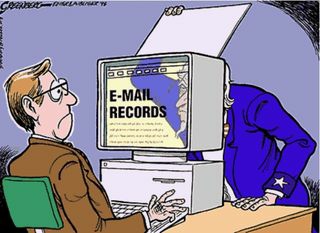The IRS Doesn't Consider Emails Private
Strategizing with your accountant about how to avoid paying taxes? Asking your mom whether you really have to declare that research stipend? These conversations best not happen over email.
The IRS believes it can access taxpayer's emails without a warrant, according to a response to the American Civil Liberties Union (ACLU)'s asking for the agency's privacy policy. As a defense, the IRS seems to conjure the Electronic Communications Privacy Act (ECPA), which the ACLU calls "hopelessly outdated":
"It draws a distinction between email that is stored on an email provider's server for 180 days or less, and email that is older or has been opened. The former requires a warrant; the latter does not. Luckily, the Fourth Amendment still protects against unreasonable searches by the government."
Enacted in 1986, the Act doesn't account for where many people now store email: in the cloud. Similarly, the agency seems to claim that people have "no privacy expectation" for email stored on a server.
Although the IRS denies doing so, the agency may search social media sites for posts that may contradict some of the claims made on tax returns.
Discussion Starters:
- If the IRS did search and read your emails, what would it find?
- Does this news make you more cautious about what you might send over email? How so?